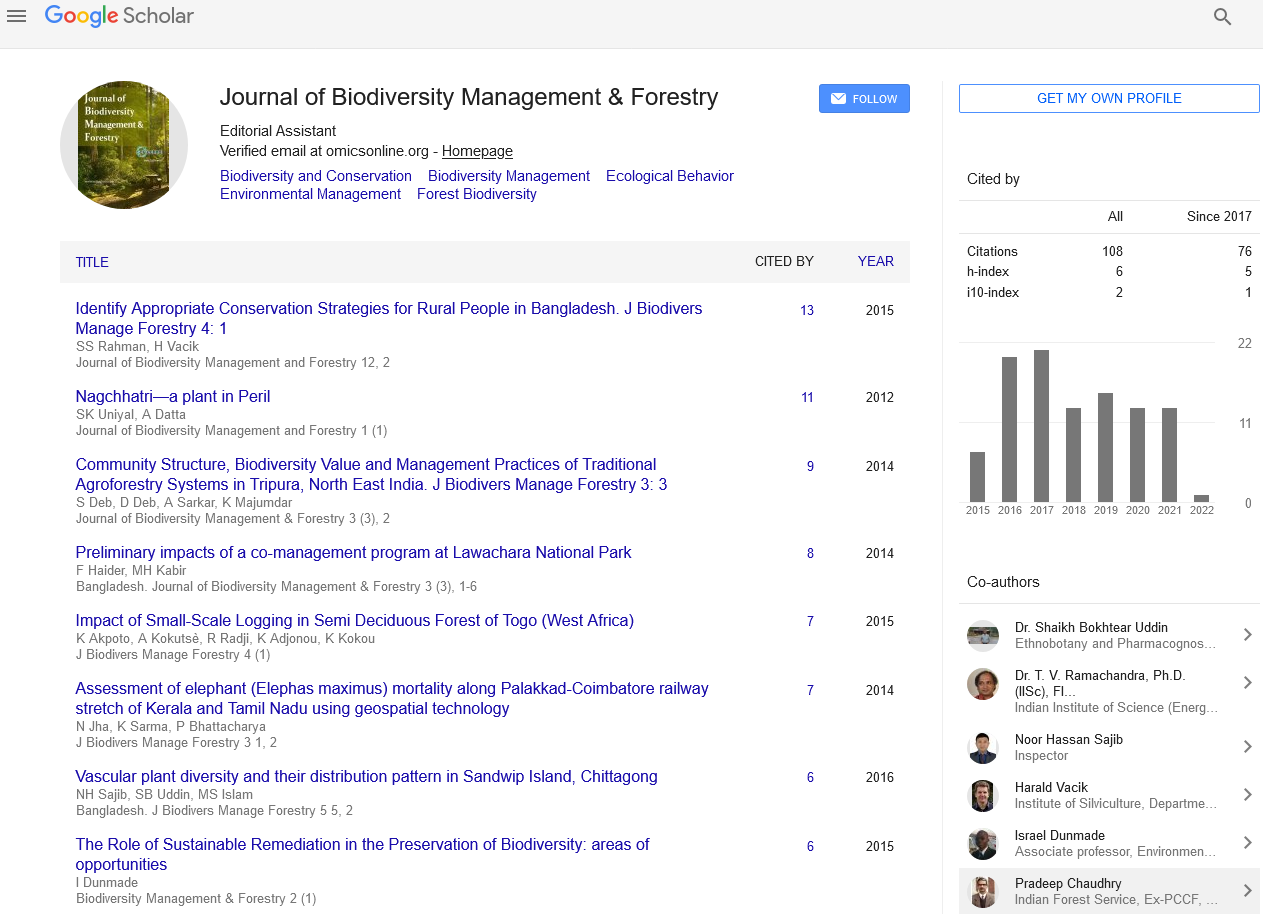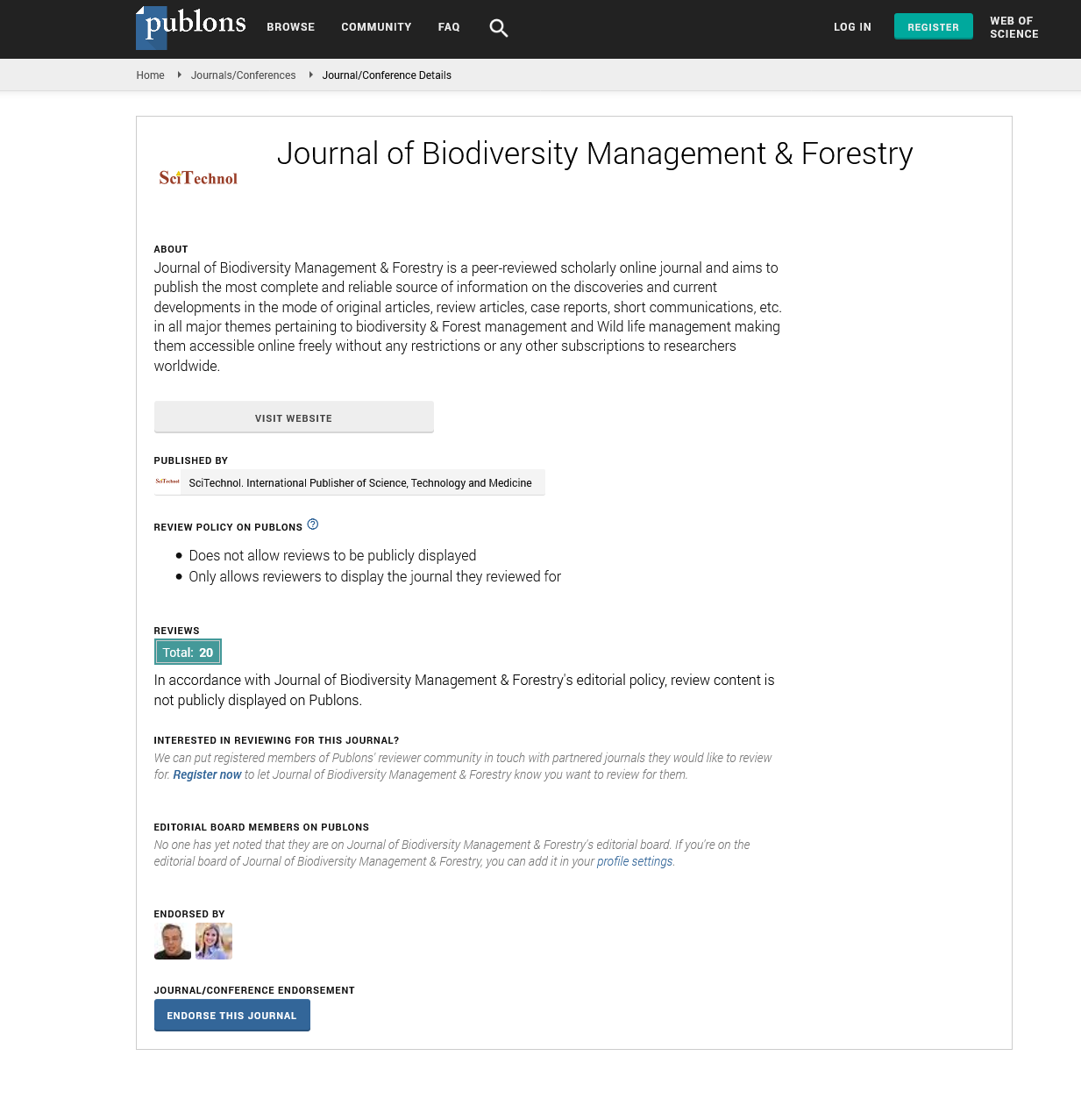Opinion Article, J Biodivers Manage Forestry Vol: 12 Issue: 5
The NTFP Revolution: Transforming Forest Conservation
Sun Lee*
1Department of Agricultural Technology, Seoul National University, Pyeongchang, Republic of Korea
*Corresponding Author: Sun Lee,
Department of Agricultural Technology, Seoul
National University, Pyeongchang, Republic of Korea
E-mail: sun.lee@ac.kr
Received date: 28 November, 2023, Manuscript No. JBMF-23-123678;
Editor assigned date: 30 November, 2023, Pre QC No. JBMF-23-123678 (PQ);
Reviewed date: 15 December, 2023, QC No. JBMF-23-123678;
Revised date: 22 December, 2023, Manuscript No. JBMF-23-123678 (R);
Published date: 29 December, 2023, DOI: 10.4172/jbmf 2327-4417.1000061
Citation: Lee S (2023) The NTFP Revolution: Transforming Forest Conservation. J Biodivers Manage Forestry 12:5.
Description
Non-Timber Forest Products (NTFPs) and environmental sustainability are intrinsically linked, as the utilization and management of these products play a essential role in maintaining ecological balance, preserving biodiversity, and supporting the livelihoods of local communities. The definition of NTFPs, their ecological significance, and the ways in which their sustainable harvesting contributes to environmental well-being will be discussed. Non-Timber Forest Products encompass a diverse array of goods and services derived from forests that do not involve the harvesting of timber. These products can include but are not limited to fruits, nuts, seeds, resins, latex, medicinal plants, spices, fibers, and various other plant and animal products. Unlike timber extraction, which involves cutting down trees, NTFP harvesting can be sustainable if conducted with care and consideration for the ecological integrity of the forest ecosystem. NTFPs often come from a variety of plant and animal species. Harvesting a diverse range of products encourages the conservation of multiple species, fostering biodiversity in forest ecosystems. Sustainable collection practices help maintain the population of these species and their habitats.
Forests provide numerous ecosystem services, including carbon sequestration, water regulation, and soil fertility. NTFPs contribute to the maintenance of these services by supporting the health and functionality of the forest ecosystem. For instance, certain plants contribute to soil fertility, while others may play a role in watershed management. Many NTFPs are deeply embedded in the cultural and traditional practices of local communities. The sustainable use of these products ensures the preservation of cultural heritage and the continuation of traditional knowledge regarding the use of forest resources. Some NTFPs exhibit resilience to environmental changes, making them valuable in the context of climate change. For example, certain plant species may have properties that make them adaptable to changing climatic conditions, providing a potential resource for communities facing environmental challenges. Sustainable harvesting practices involve careful consideration of regeneration rates and ecological impact. Harvesting in a manner that allows for natural regeneration and recovery helps maintain the resilience of the ecosystem. For instance, selective harvesting of fruits and nuts allows the parent trees to continue producing seeds and supports the regeneration of new plants.
Some NTFPs come from species that may be threatened or endangered. Sustainable harvesting involves monitoring and managing the collection of products from these species to prevent overexploitation and support their conservation. By promoting the use of NTFPs, there is less reliance on timber extraction for economic activities. This reduces the pressure on forests, minimizing deforestation and its associated environmental impacts, such as loss of habitat, disruption of water cycles, and increased carbon emissions. Sustainable harvesting of NTFPs contributes to the economic wellbeing of local communities. When communities benefit from the responsible use of forest resources, they are more likely to become stewards of the forest, actively participating in its conservation and sustainable management. Creating market opportunities for sustainably harvested NTFPs can incentivize conservation. Certification systems, such as Fair Trade and Forest Stewardship Council (FSC) certification, provide consumers with assurance that the products they purchase have been sourced in an environmentally and socially responsible manner.
The challenge lies in finding a balance between meeting the economic needs of communities and ensuring the long-term health of the forest. Overharvesting and habitat degradation can occur if harvesting practices are not carefully managed. Respecting the cultural significance of NTFPs and integrating traditional knowledge into sustainable management practices is essential. Balancing modern conservation approaches with indigenous wisdom is essential for the whole well-being of both ecosystems and communities. Ensuring fair market access for communities involved in NTFP harvesting is essential for the success of sustainable practices. Fair trade initiatives can play a role in addressing issues of equity and ensuring that local communities receive fair compensation for their efforts. Non-Timber Forest Products play a pivotal role in the intersection of environmental sustainability and community well-being. By adopting sustainable harvesting practices and recognizing the ecological significance of NTFPs, it is possible to exploit the economic potential of these products while safeguarding the health and diversity of forest ecosystems. The synergy between responsible resource management, conservation efforts, and community involvement is key to realizing the full potential of NTFPs as a sustainable and environmentally beneficial resource.
 Spanish
Spanish  Chinese
Chinese  Russian
Russian  German
German  French
French  Japanese
Japanese  Portuguese
Portuguese  Hindi
Hindi 
